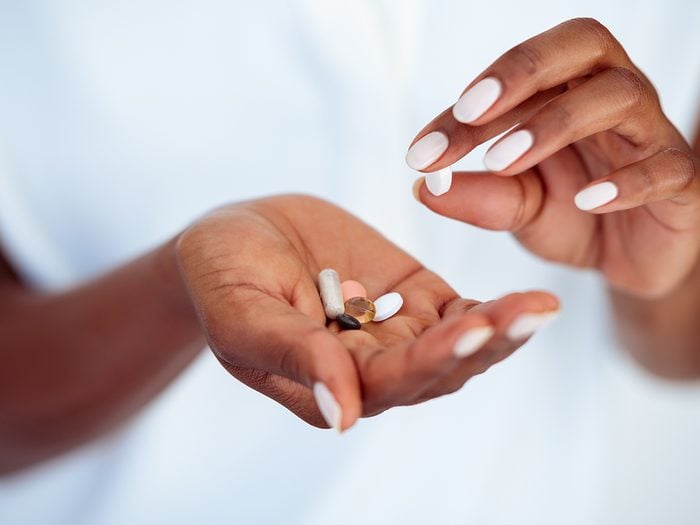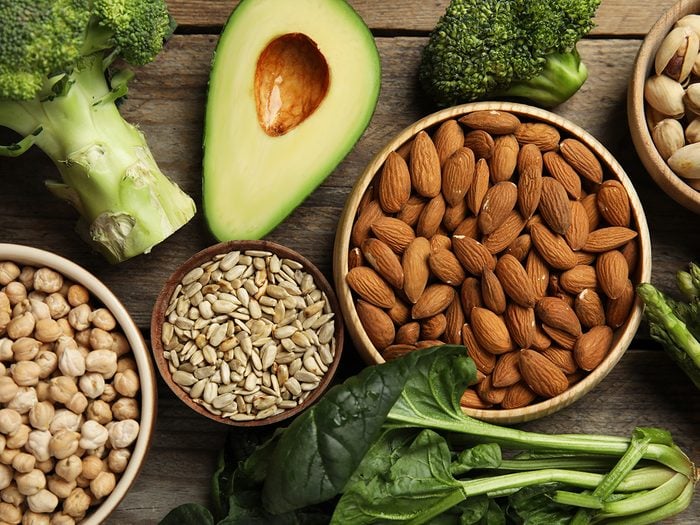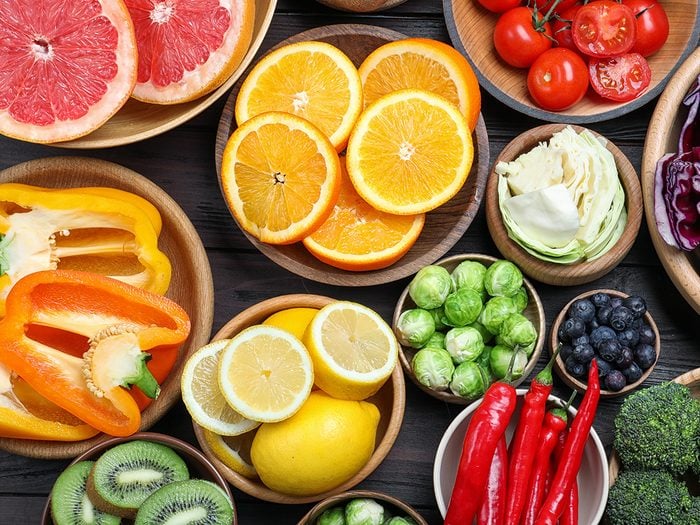
Vitamins can help keep your immune system functioning so it can fight off infections—especially during cold and flu season. When you walk down the vitamin aisle looking for the right immune-boosting benefits, though, it might feel overwhelming—which is why we turned to the experts to determine which vitamins doctors take this time of year.
Truthfully, they don’t take much. And it seems to come from the foundation of eating well. While some macronutrients are known to play a role in immune health according to a 2020 study published in Nutrients, doctors tend to rely on food sources—not pills—to get their fill.
“My main goal is to make sure that I’m nutritionally balanced in order to have a good fighting immune system,” says Sharon Palmer, RDN, a registered dietitian nutritionist from Ojai, California.
For some, that balance may include vitamins or supplements. “If you have nutrient deficiencies, supplementation can help in boosting immunity,” says Ali Bandier, MS, RD, a registered dietitian from New York. “But if you’re already meeting your daily needs through a healthy diet, it remains unclear how impactful additional supplementation can be.”
“That being said, most people are not meeting their daily nutrient needs, with less than 15% of Americans meeting daily fruit and vegetable recommendations,” Bandier adds.
That means for most of us, supplementing the right nutrients can make a big difference in staying healthy. To help you fend off the flu or curb the cold, we asked health professionals to share the select few vitamins they do reach for during virus season.

Vitamin E
Vitamin E is a powerful antioxidant that can strengthen immune function, Bandier says.
“The best form to get vitamin E is through food,” Bandier adds. “Vitamin E deficiencies are rare, so like with anything else, too much can be harmful. Excellent sources of vitamin E include seeds and nuts/nut butters; dark leafy greens, like spinach and broccoli; fruits such as kiwi, tomatoes and mango; and wheat germ oil.”
Don’t miss our ultimate guide to healthy grocery shopping.

Vitamin C
Though vitamin C can’t prevent colds according to the National Center for Complementary and Integrative Health, a 2017 study published in Nutrients suggests it is still a vital nutrient for a strong immune system.
“The best way to get adequate vitamin C is through food, and those that are high in it include citrus fruits like oranges, grapefruit and kiwi; cruciferous vegetables like raw broccoli and brussels sprouts; as well as strawberries, tomatoes and white potatoes,” Bandier says.
2021 research published in BMJ Global Health found that vitamins C and D reduced the risk of acute respiratory infections and shortened the duration of symptoms. A 2022 meta-analysis published in Current Reviews in Clinical and Experimental Pharmacology also found that vitamin C can reduce the duration of respiratory tract infections.
In addition to a daily multivitamin, Bandier takes a supplement with elderberry, vitamin C, vitamin D and zinc during cold and flu season. (Sometimes she takes a Lypo-C, a vitamin C supplement that claims to be easily absorbed in the body, Bandier adds.)
Michael Miller, MD, a cardiology professor at the University of Pennsylvania, says he doesn’t take a multivitamin (or any vitamin supplements) on a regular basis because it’s healthier to obtain them naturally through your diet. However, when he gets sick, he does occasionally reach for vitamin C.
“I will take 2 grams of vitamin C supplements twice daily when I have a cold because vitamin C has been shown to reduce the symptoms and duration associated with a cold. I have been doing that since medical school,” Dr. Miller says.
Brush up on the essential vitamins your body needs to stay healthy.

Vitamin D
Many people don’t get enough vitamin D in their diets—it’s hard to. That’s why taking a vitamin D supplement seems to be high on the list for a lot of medical professionals. Plus, a 2022 study published in Frontiers in Nutrition indicates that vitamin D can prevent influenza infection.
“I make sure that I am getting a good source of vitamin C, D and E in my diet through whole foods and supplements. I take vitamin D,” Palmer says.
Like Palmer, Zhaoping Li, MD, PhD, a professor medicine and chief of the Division of Clinical Nutrition at UCLA, says she takes vitamin D as well. (Just as important for a healthy immune system is a balanced diet, enough sleep and regular exercise, Dr. Li says.)
Discover the secrets to a good night’s sleep.

Omega-3 fatty acids
Dr. Li also regularly takes fish oil for its immune system benefits, though according to the Cleveland Clinic the research tends to go back and forth on who should take these supplements and how much.
Depending on your diet—for example, if you don’t eat fish—you may not get a lot of this nutrient. Popping an omega-3 fatty acid supplement can be a good solution.
Palmer says she’s been prioritizing good sources of omega-3 fatty acids in her diet for over a decade. “I include mushrooms in my diet daily, lots of fibre and probiotics and a source of omega-3 fatty acids, too,” Palmer says.
Find out the healthiest fish you can eat.

What vitamins for virus season are best?
There’s a reason there aren’t too many vitamins listed here—a lot of doctors don’t take many supplements.
For example, Christopher Gardner, PhD, a professor at Stanford University and chair of the American Heart Association’s Nutrition Committee. He’s 64 and he’s never taken supplements.
“I don’t ever remember missing a lecture, an event, a celebration or a meeting due to illness,” Gardner says. “I suppose every 4 to 5 years I get a mild cold.”
So, what’s his secret?
“I eat a whole-food plant-based diet and like to cook. I get a good variety of healthy foods, all the time,” Gardner says. “All my nutrients and antioxidants come from food.”
Next, find out eight science-backed ways to boost your immune system.